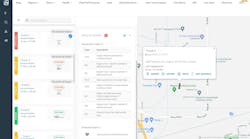Congressional markup of the proposed tank trailer wetlines legislation should proceed on Thursday, November 19. Markup comes just days after what has been termed a very productive field trip to a Baltimore MD cargo tank repair shop and a public hearing convened by Rep Corrine Brown (D-FL), chairman of the House Transportation and Infrastructure Subcommittee on Railroads, Pipelines, and Hazardous Materials.
Markup of House bill HR4016 (which would ban wetlines on all tank trailers that handle hazardous materials) originally was set for November 5 but was delayed two weeks to give members of the subcommittee more time to study the issue. Further study included the November 16 field trip to Baltimore Cargo Tank and a public hearing at the University of Maryland-Baltimore campus.
Rep Brown led the fact-finding mission and was joined by other members of the subcommittee, including Rep Bill Shuster (R-PA), ranking minority member on the subcommittee; Rep Elijah Cummins (D-MD); Rep Timothy J Walz (D-WI); and Rep Grace Napolitano (D-CA). The Congressional delegation also included Rep Donna Edwards (D-MD), a member of the full House Transportation and Infrastructure Committee; Rep Tom Petri (R-WI) and Rep Robert Latta (R-OH).
“We appreciate the opportunity to speak with these Congressmen and present our case,” said Dan Furth, National Tank Truck Carriers vice-president. “We believe the shop visit and public hearing were productive. We got good questions from the members of the Congressional delegation, and members of the tank truck industry provided strong testimony to answer those questions.
“We are optimistic that the subcommittee understands the tank truck industry perspective and concerns. We are guardedly hopeful that the Congressmen will give the tank truck industry a reasonable amount of time to develop safe and practical approaches to resolve the wetlines issues. The key here is to avoid potentially dangerous requirements, specifically the ill-conceived retrofit requirement.”
The field trip started in the morning on November 16 at Baltimore Cargo Tank Services, where company president Roy Clark and his staff gave a tour of the shop and discussed cargo tank repair issues. In the afternoon, Rep Brown chaired a lively public hearing. Barbara Windsor, Hahn Transportation president, and John Cannon, Brenner Tank LLC vice-president of sales & marketing, testified on behalf of the tank truck industry. R J Molder, vice-president of fleet services at Kenan Advantage Group (KAG), offered additional comments during the public forum that followed the panel testimony.
Requiring tank trucks to purge excess product from external product piping—wetlines—will not improve the transport of flammable liquids and is dangerous to technicians that would have to retrofit the purging technology, Windsor told the Congressmen. “We believe the industry’s safety record demonstrates that a mandate for wetlines-purging equipment is simply not justified,” she said. “Government statistics indicate that the risk of a fatal wetlines incident is approximately 1 in 30,000,000…In fact, the odds of being struck by lightning during your lifetime are 6,000 times greater than the odds of being killed in a wetlines incident.”
Cannon urged the subcommittee to limit any wetlines ban to just DOT406 cargo tanks, and he called for flexibility in the legislation that would allow alternate approaches to mitigate the risk of a wetlines incident. “By allowing alternative approaches, owners of tank trailers would be able to choose the manner of compliance that best works for their fleet,” he said. “We will need at least a year to develop alternate approaches once regulatory guidelines are published, and it will take at least one more year to bring the alternate approaches to market.”
Molder talked about the financial impact that a wetlines ban would have on a tank truck carrier like KAG, which buys approximately 100 new tank trailers each year. “We have been told that a wetlines purging system would add approximately $5,000 to the cost of a new trailer and would increase our capital expenses by $500,000 per year,” he said. “KAG may be forced to purchase fewer new trailers and will have to run its older trailers for a longer period of time. We estimate that a retrofit requirement—scheduled to take effect in 2020—would cost KAG over $13.8 million.
“KAG also has concerns over the impact of a wetlines purging system on our operating expenses. We have been told that a wetlines purging system takes approximately 10 minutes to purge the tank truck external pipes. Downtime from waiting for the system to purge would amount to a significant cost. We estimate that operation of a wetlines purging system would add 355,000 hours of driver downtime to our operating costs. That translates to a $7.6 million increase in our labor expenses. We’re also concerned about costs associated with purging system failure. A purging system malfunction would require KAG to park the tank truck and transfer the contents to another truck. The cost associated with a malfunction could be approximately $1,000 per incident.”
The markup session on Thursday essentially is the last opportunity to amend HR4016 in the House of Representatives, but NTTC officials have vowed to keep fighting the legislation in the Senate if House Transportation and Infrastructure Committee Chairman James Oberstar strong arms the Democrats on the committee to vote for the bill.
“We can’t give up in the House, though,” said John Conley NTTC president. “We encourage members of the tank truck industry to make a final effort to their Congressional representatives to support the amendments offered by NTT and the American Trucking Associations.”








